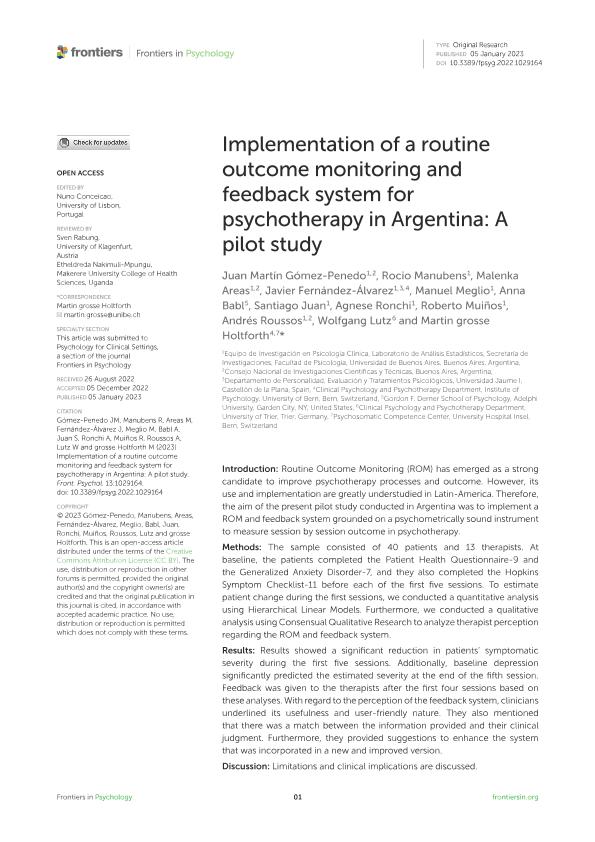Mostrar el registro sencillo del ítem
dc.contributor.author
Gómez Penedo, Juan Martín

dc.contributor.author
Manubens, Rocío Tamara

dc.contributor.author
Areas, Malenka Alejandra

dc.contributor.author
Fernández Álvarez, Javier
dc.contributor.author
Meglio, Manuel
dc.contributor.author
Babl, Anna
dc.contributor.author
Juan, Santiago

dc.contributor.author
Ronchi, Agnese
dc.contributor.author
Muiños, Roberto Daniel

dc.contributor.author
Roussos, Andres Jorge

dc.contributor.author
Lutz, Wolfgang
dc.contributor.author
Grosse Holtforth, Martin
dc.date.available
2023-12-11T15:31:14Z
dc.date.issued
2023-01
dc.identifier.citation
Gómez Penedo, Juan Martín; Manubens, Rocío Tamara; Areas, Malenka Alejandra; Fernández Álvarez, Javier; Meglio, Manuel; et al.; Implementation of a routine outcome monitoring and feedback system for psychotherapy in Argentina: A pilot study; Frontiers Media; Frontiers in Psychology; 13; 5; 1-2023; 1-10
dc.identifier.uri
http://hdl.handle.net/11336/219811
dc.description.abstract
Introduction: Routine Outcome Monitoring (ROM) has emerged as a strong candidate to improve psychotherapy processes and outcome. However, its use and implementation are greatly understudied in Latin-America. Therefore, the aim of the present pilot study conducted in Argentina was to implement a ROM and feedback system grounded on a psychometrically sound instrument to measure session by session outcome in psychotherapy. Methods: The sample consisted of 40 patients and 13 therapists. At baseline, the patients completed the Patient Health Questionnaire-9 and the Generalized Anxiety Disorder-7, and they also completed the Hopkins Symptom Checklist-11 before each of the first five sessions. To estimate patient change during the first sessions, we conducted a quantitative analysis using Hierarchical Linear Models. Furthermore, we conducted a qualitative analysis using Consensual Qualitative Research to analyze therapist perception regarding the ROM and feedback system. Results: Results showed a significant reduction in patients’ symptomatic severity during the first five sessions. Additionally, baseline depression significantly predicted the estimated severity at the end of the fifth session. Feedback was given to the therapists after the first four sessions based on these analyses. With regard to the perception of the feedback system, clinicians underlined its usefulness and user-friendly nature. They also mentioned that there was a match between the information provided and their clinical judgment. Furthermore, they provided suggestions to enhance the system that was incorporated in a new and improved version. Discussion: Limitations and clinical implications are discussed.
dc.format
application/pdf
dc.language.iso
eng
dc.publisher
Frontiers Media

dc.rights
info:eu-repo/semantics/openAccess
dc.rights.uri
https://creativecommons.org/licenses/by/2.5/ar/
dc.subject
BASELINE CHARACTERISTICS
dc.subject
FEEDBACK
dc.subject
MONITORING
dc.subject
PSYCHOTHERAPY OUTCOME
dc.subject
ROM
dc.subject.classification
Otras Psicología

dc.subject.classification
Psicología

dc.subject.classification
CIENCIAS SOCIALES

dc.title
Implementation of a routine outcome monitoring and feedback system for psychotherapy in Argentina: A pilot study
dc.type
info:eu-repo/semantics/article
dc.type
info:ar-repo/semantics/artículo
dc.type
info:eu-repo/semantics/publishedVersion
dc.date.updated
2023-12-07T17:45:29Z
dc.identifier.eissn
1664-1078
dc.journal.volume
13
dc.journal.number
5
dc.journal.pagination
1-10
dc.journal.pais
Suiza

dc.journal.ciudad
Lausanne
dc.description.fil
Fil: Gómez Penedo, Juan Martín. Consejo Nacional de Investigaciones Científicas y Técnicas; Argentina. Universidad de Buenos Aires. Facultad de Psicología; Argentina
dc.description.fil
Fil: Manubens, Rocío Tamara. Universidad de Buenos Aires. Facultad de Psicología; Argentina
dc.description.fil
Fil: Areas, Malenka Alejandra. Consejo Nacional de Investigaciones Científicas y Técnicas; Argentina. Universidad de Buenos Aires. Facultad de Psicología; Argentina
dc.description.fil
Fil: Fernández Álvarez, Javier. University of Bern; Suiza. Universitat Jaume I; España. Universidad de Buenos Aires. Facultad de Psicología; Argentina
dc.description.fil
Fil: Meglio, Manuel. Universidad de Buenos Aires. Facultad de Psicología; Argentina
dc.description.fil
Fil: Babl, Anna. Adelphi University; Estados Unidos
dc.description.fil
Fil: Juan, Santiago. Consejo Nacional de Investigaciones Científicas y Técnicas; Argentina. Universidad de Buenos Aires. Facultad de Psicología; Argentina
dc.description.fil
Fil: Ronchi, Agnese. Universidad de Buenos Aires. Facultad de Psicología; Argentina
dc.description.fil
Fil: Muiños, Roberto Daniel. Universidad de Buenos Aires. Facultad de Psicología; Argentina
dc.description.fil
Fil: Roussos, Andres Jorge. Consejo Nacional de Investigaciones Científicas y Técnicas; Argentina. Universidad de Buenos Aires. Facultad de Psicología; Argentina
dc.description.fil
Fil: Lutz, Wolfgang. Universitat Trier; Alemania
dc.description.fil
Fil: Grosse Holtforth, Martin. University of Bern; Suiza. University Hospital Insel; Suiza
dc.journal.title
Frontiers in Psychology
dc.relation.alternativeid
info:eu-repo/semantics/altIdentifier/url/https://www.frontiersin.org/articles/10.3389/fpsyg.2022.1029164/full
dc.relation.alternativeid
info:eu-repo/semantics/altIdentifier/doi/http://dx.doi.org/10.3389/fpsyg.2022.1029164
Archivos asociados
